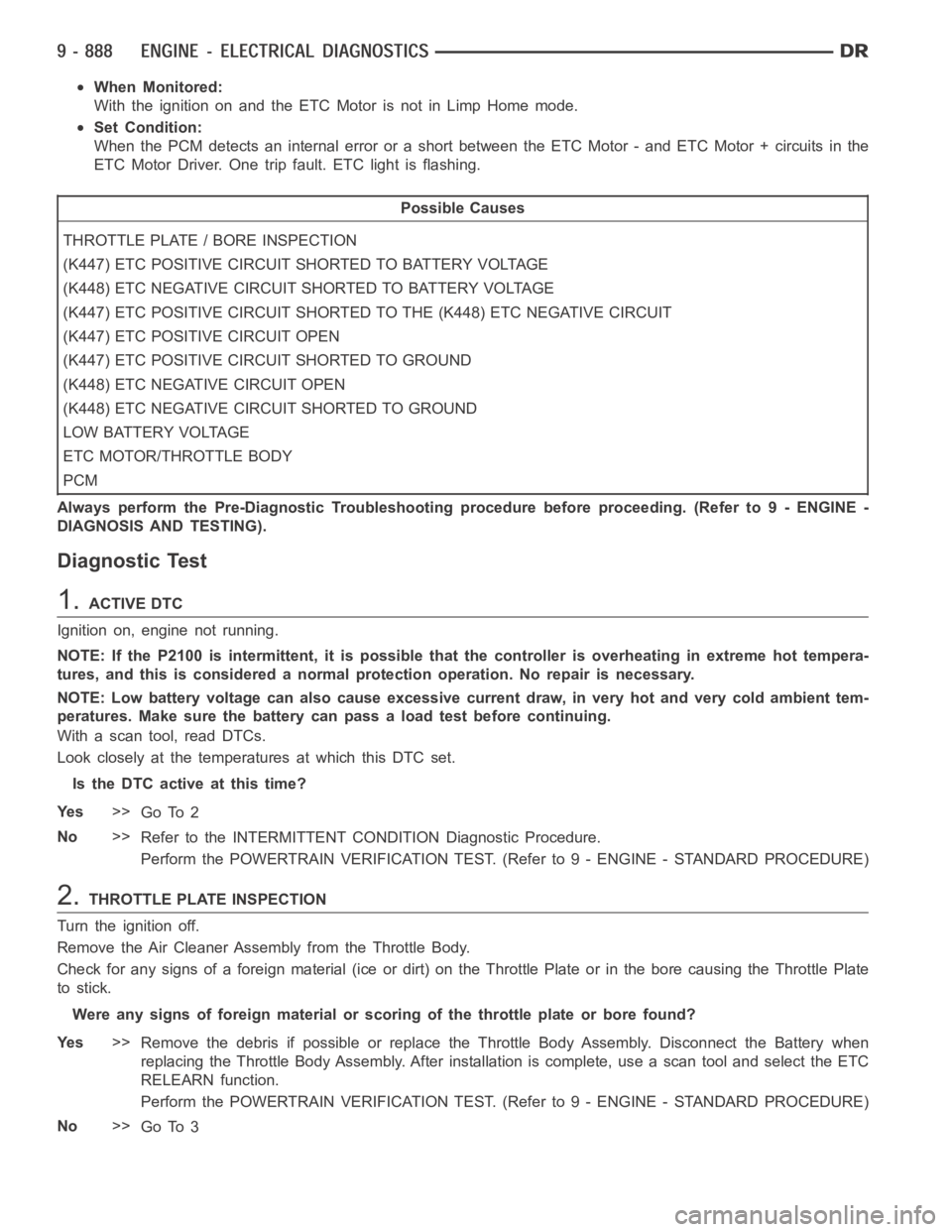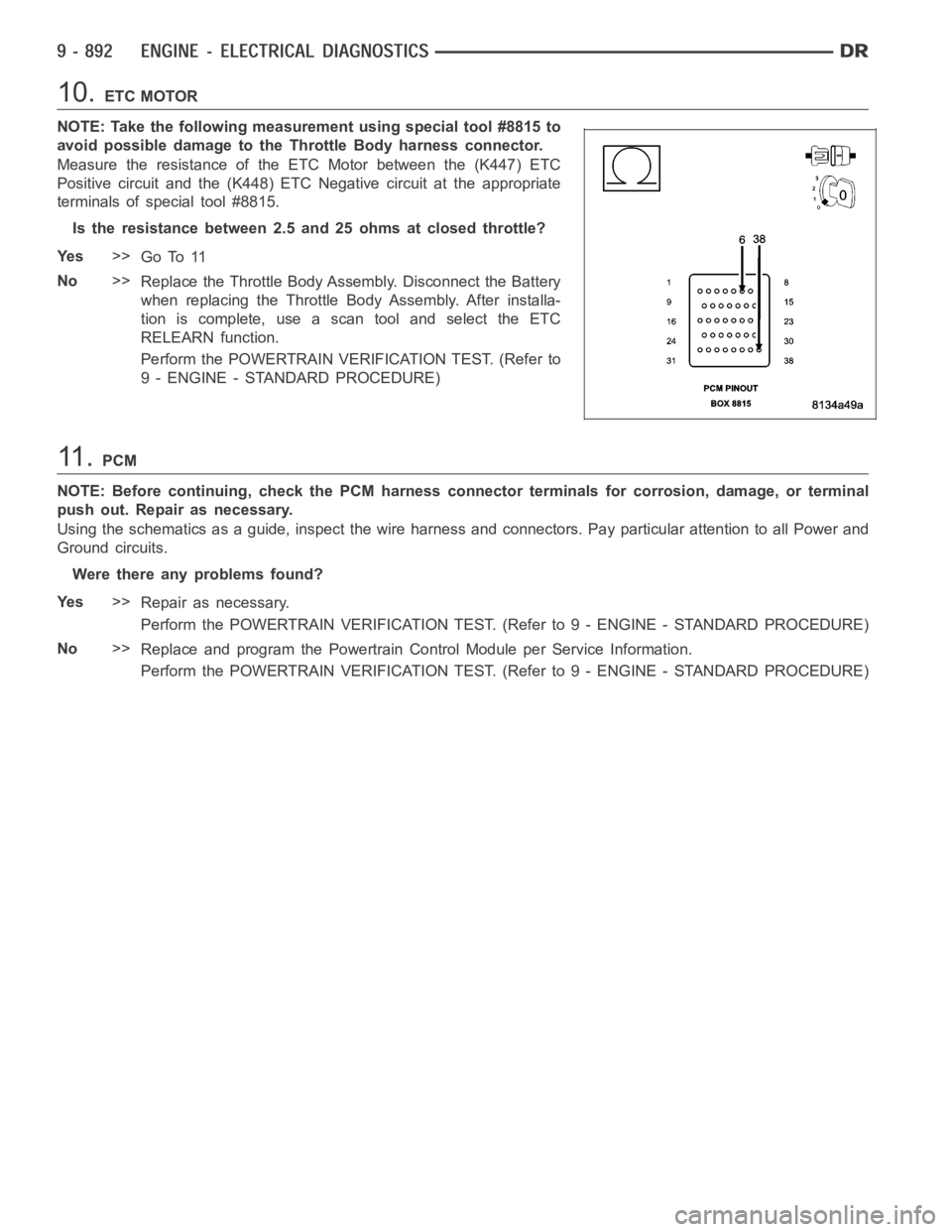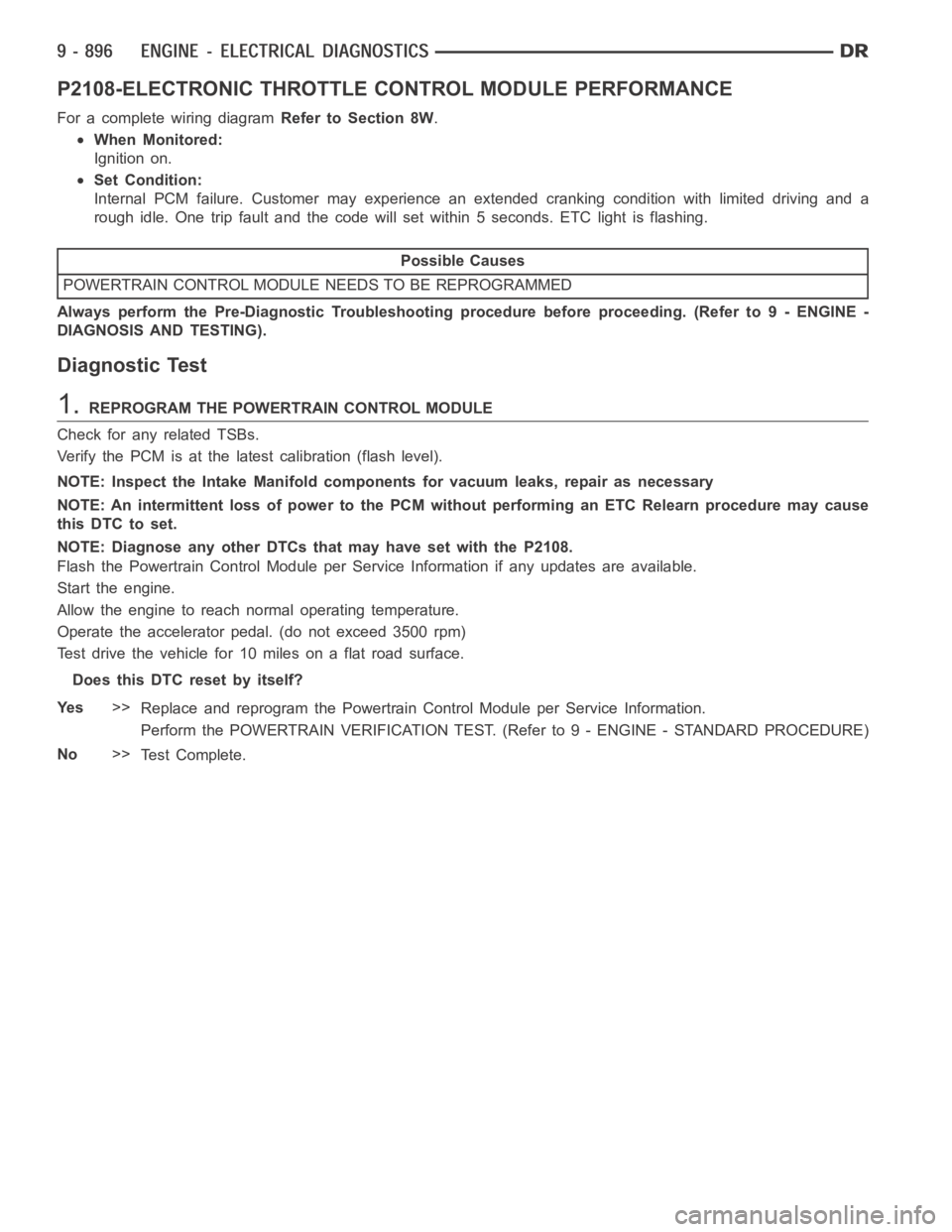2006 DODGE RAM SRT-10 check engine
[x] Cancel search: check enginePage 193 of 5267

5.(K243) O2 SENSOR 2/2 SIGNAL CIRCUIT
Remove the jump wire.
Ignition on, engine not running.
With the scan tool, monitor the 2/2 O2 Sensor voltage.
Is the voltage above 4.8 volts?
Ye s>>
Check the (K243) O2 Sensor 2/2 Signal circuit for an open
or short to battery voltage. Inspect the O2 Sensor connector
and the PCM harness connector. If OK, replace and pro-
gram the Powertrain Control Module per Service Informa-
tion.
Perform the POWERTRAIN VERIFICATION TEST. (Refer to
9 - ENGINE - STANDARD PROCEDURE)
No>>
Go To 6
Page 194 of 5267

6.(K399) O2 SENSOR 2/2 HEATER CONTROL CIRCUIT OPEN
Turn the ignition off.
Disconnect the C3 PCM harness connector.
Measure the resistance of the (K399) O2 Sensor 2/2 Heater Control cir-
cuit from the O2 Sensor harness connector to the appropriate terminal
of special tool #8815.
Is the resistance below 5.0 ohms?
Ye s>>
Go To 7
No>>
Repair the open in the (K399) O2 Sensor 2/2 Heater Con-
trol circuit.
Perform the POWERTRAIN VERIFICATION TEST. (Refer to
9 - ENGINE - STANDARD PROCEDURE)
7.(K904) O2 RETURN DOWNSTREAM CIRCUIT
Measure the voltage on the (K904) O2 Return Downstream circuit in the
O2 Sensor harness connector.
Is the voltage at 2.5 volts?
Ye s>>
Check the fuel system for contaminants.
Perform the POWERTRAIN VERIFICATION TEST. (Refer to
9 - ENGINE - STANDARD PROCEDURE)
No>>
Check the (K904) O2 Downstream Return circuit for a short
to ground, open, or short to voltage. Inspect the O2 Sensor
connector and the PCM harness connector. If OK, replace
and program the Powertrain Control Module per Service
Information.
Perform the POWERTRAIN VERIFICATION TEST. (Refer to
9 - ENGINE - STANDARD PROCEDURE)
Page 197 of 5267

When Monitored:
With the ignition on and the ETC Motor is not in Limp Home mode.
Set Condition:
When the PCM detects an internal error or a short between the ETC Motor - and ETC Motor + circuits in the
ETC Motor Driver. One trip fault. ETC light is flashing.
Possible Causes
THROTTLE PLATE / BORE INSPECTION
(K447) ETC POSITIVE CIRCUIT SHORTED TO BATTERY VOLTAGE
(K448) ETC NEGATIVE CIRCUIT SHORTED TO BATTERY VOLTAGE
(K447) ETC POSITIVE CIRCUIT SHORTED TO THE (K448) ETC NEGATIVE CIRCUIT
(K447) ETC POSITIVE CIRCUIT OPEN
(K447) ETC POSITIVE CIRCUIT SHORTED TO GROUND
(K448) ETC NEGATIVE CIRCUIT OPEN
(K448) ETC NEGATIVE CIRCUIT SHORTED TO GROUND
LOW BATTERY VOLTAGE
ETC MOTOR/THROTTLE BODY
PCM
Always perform the Pre-Diagnostic Troubleshooting procedure before proceeding. (Refer to 9 - ENGINE -
DIAGNOSIS AND TESTING).
Diagnostic Test
1.ACTIVE DTC
Ignition on, engine not running.
NOTE: If the P2100 is intermittent, it is possible that the controller is overheating in extreme hot tempera-
tures, and this is considered a normal protection operation. No repair is necessary.
NOTE: Low battery voltage can also cause excessive current draw, in very hot and very cold ambient tem-
peratures. Make sure the battery can pass a load test before continuing.
With a scan tool, read DTCs.
Look closely at the temperatures at which this DTC set.
Is the DTC active at this time?
Ye s>>
Go To 2
No>>
Refer to the INTERMITTENT CONDITION Diagnostic Procedure.
Perform the POWERTRAIN VERIFICATION TEST. (Refer to 9 - ENGINE - STANDARD PROCEDURE)
2.THROTTLE PLATE INSPECTION
Turn the ignition off.
Remove the Air Cleaner Assembly from the Throttle Body.
Check for any signs of a foreign material (ice or dirt) on the Throttle Plateor in the bore causing the Throttle Plate
to stick.
Were any signs of foreign material or scoring of the throttle plate or bore found?
Ye s>>
Remove the debris if possible or replace the Throttle Body Assembly. Disconnect the Battery when
replacing the Throttle Body Assembly. After installation is complete, use a scan tool and select the ETC
RELEARN function.
Perform the POWERTRAIN VERIFICATION TEST. (Refer to 9 - ENGINE - STANDARD PROCEDURE)
No>>
Go To 3
Page 201 of 5267

10.ETC MOTOR
NOTE: Take the following measurement using special tool #8815 to
avoid possible damage to the Throttle Body harness connector.
Measure the resistance of the ETC Motor between the (K447) ETC
Positive circuit and the (K448) ETC Negative circuit at the appropriate
terminals of special tool #8815.
Is the resistance between 2.5 and 25 ohms at closed throttle?
Ye s>>
Go To 11
No>>
Replace the Throttle Body Assembly. Disconnect the Battery
when replacing the Throttle Body Assembly. After installa-
tion is complete, use a scan tool and select the ETC
RELEARN function.
Perform the POWERTRAIN VERIFICATION TEST. (Refer to
9 - ENGINE - STANDARD PROCEDURE)
11 .PCM
NOTE: Before continuing, check the PCM harness connector terminals for corrosion, damage, or terminal
push out. Repair as necessary.
Using the schematics as a guide, inspect the wire harness and connectors. Pay particular attention to all Power and
Ground circuits.
Were there any problems found?
Ye s>>
Repair as necessary.
Perform the POWERTRAIN VERIFICATION TEST. (Refer to 9 - ENGINE - STANDARD PROCEDURE)
No>>
Replace and program the Powertrain Control Module per Service Information.
Perform the POWERTRAIN VERIFICATION TEST. (Refer to 9 - ENGINE - STANDARD PROCEDURE)
Page 202 of 5267

P2101-ELECTRONIC THROTTLE CONTROL MOTOR PERFORMANCE
For a complete wiring diagramRefer to Section 8W.
When Monitored:
With the vehicle running, ETC Motor not in Limp Home mode, and the TPS adaptation is complete.
Set Condition:
The PCM recognizes too large of an error between the actual position of the Throttle Plate and the Set Point
position. One trip fault and the code will set within 5 seconds. Three good trips to turn off the MIL ETC light is
flashing.
Possible Causes
THROTTLE BODY ASSEMBLY
LOW BATTERY VOLTAGE
PCM
Always perform the Pre-Diagnostic Troubleshooting procedure before proceeding. (Refer to 9 - ENGINE -
DIAGNOSIS AND TESTING).
Diagnostic Test
1.ACTIVE DTC
NOTE: Before continuing visually inspect the throttle blade and bore for any obstructions. Icing of the throt-
tlebodymayhavecausedthiscodetoset.
NOTE: Low battery voltage can also cause excessive current draw, in very hot and very cold ambient tem-
perature. Make sure the battery can pass a Load test before continuing.
NOTE: Diagnose any 5-Volt Supply, Battery, and TP Sensor DTCs before continuing.
Ignition on, engine not running.
With a scan tool, read DTCs.
Is the DTC active at this time?
Ye s>>
Go To 2
No>>
Refer to the INTERMITTENT CONDITION Diagnostic Procedure.
Perform the POWERTRAIN VERIFICATION TEST. (Refer to 9 - ENGINE - STANDARD PROCEDURE)
2.THROTTLE PLATE INSPECTION
Turn the ignition off.
Remove the Air Cleaner Assembly from the Throttle Body.
Check for any signs of a foreign material (ice or dirt) on the Throttle Plateor in the bore causing the Throttle Plate
to stick.
Manually open and close the throttle plate using your hands.
Does the Throttle Plate move?
Ye s>>
Go To 3
No>>
Remove the debris if possible or replace the Throttle Body Assembly. Disconnect the Battery when
replacing the Throttle Body Assembly. After installation is complete, use a scan tool and select the ETC
RELEARN function.
Perform the POWERTRAIN VERIFICATION TEST. (Refer to 9 - ENGINE - STANDARD PROCEDURE)
Page 204 of 5267

P2107-ELECTRONIC THROTTLE CONTROL MODULE PROCESSOR
For a complete wiring diagramRefer to Section 8W.
When Monitored:
Ignition on.
Set Condition:
Internal PCM failure. Module will attempt to reset, so you will be able to hear the throttle relearning. If the
condition is continuous, the vehicle may not be driveable. One trip fault.ETC light is flashing.
Possible Causes
POWERTRAIN CONTROL MODULE NEEDS TO BE REPROGRAMMED
Always perform the Pre-Diagnostic Troubleshooting procedure before proceeding. (Refer to 9 - ENGINE -
DIAGNOSIS AND TESTING).
Diagnostic Test
1.REPROGRAM THE POWERTRAIN CONTROL MODULE
Check for any related TSBs.
Verify the PCM is at the latest calibration (flash level).
NOTE: An intermittent loss of power to the PCM without performing an ETC Relearn procedure may cause
this DTC to set.
Flash the Powertrain Control Module per Service Information if any updates are available.
Start the engine.
Allow the engine to reach normal operating temperature.
Operate the accelerator pedal. (do not exceed 3500 rpm)
Test drive the vehicle for 10 miles on a flat road surface.
Does this DTC reset?
Ye s>>
Replace and reprogram the Powertrain Control Module per Service Information.
Perform the POWERTRAIN VERIFICATION TEST. (Refer to 9 - ENGINE - STANDARD PROCEDURE)
No>>
Te s t C o m p l e t e .
Page 205 of 5267

P2108-ELECTRONIC THROTTLE CONTROL MODULE PERFORMANCE
For a complete wiring diagramRefer to Section 8W.
When Monitored:
Ignition on.
Set Condition:
Internal PCM failure. Customer may experience an extended cranking condition with limited driving and a
rough idle. One trip fault and the code will set within 5 seconds. ETC light is flashing.
Possible Causes
POWERTRAIN CONTROL MODULE NEEDS TO BE REPROGRAMMED
Always perform the Pre-Diagnostic Troubleshooting procedure before proceeding. (Refer to 9 - ENGINE -
DIAGNOSIS AND TESTING).
Diagnostic Test
1.REPROGRAM THE POWERTRAIN CONTROL MODULE
Check for any related TSBs.
Verify the PCM is at the latest calibration (flash level).
NOTE: Inspect the Intake Manifold components for vacuum leaks, repair as necessary
NOTE: An intermittent loss of power to the PCM without performing an ETC Relearn procedure may cause
this DTC to set.
NOTE: Diagnose any other DTCs that may have set with the P2108.
Flash the Powertrain Control Module per Service Information if any updates are available.
Start the engine.
Allow the engine to reach normal operating temperature.
Operate the accelerator pedal. (do not exceed 3500 rpm)
Test drive the vehicle for 10 miles on a flat road surface.
Does this DTC reset by itself?
Ye s>>
Replace and reprogram the Powertrain Control Module per Service Information.
Perform the POWERTRAIN VERIFICATION TEST. (Refer to 9 - ENGINE - STANDARD PROCEDURE)
No>>
Te s t C o m p l e t e .
Page 207 of 5267

When Monitored:
Ignition on and ETC motor is working.
Set Condition:
When the PCM requests to limit engine speed if PWM is too high for 20.5 seconds and before P2118 sets.
One trip fault and the code will set within 5 seconds. ETC light is illuminated.
Possible Causes
THROTTLE PLATE STUCK
(K447) ETC POSITIVE CIRCUIT OPEN
(K448) ETC NEGATIVE CIRCUIT OPEN
(K447) ETC POSITIVE CIRCUIT SHORTED TO GROUND
(K448) ETC NEGATIVE CIRCUIT SHORTED TO GROUND
ETC MOTOR
PCM
Always perform the Pre-Diagnostic Troubleshooting procedure before proceeding. (Refer to 9 - ENGINE -
DIAGNOSIS AND TESTING).
Diagnostic Test
1.ACTIVE DTC
Ignition on, engine not running.
With a scan tool read DTCs.
In the Freeze Frame data, look at the temperature at which the fault occurred. If it occurred in extreme cold tem-
peratures, Icing of the throttle body may have caused this code to set.
NOTE: Diagnose any TP Sensor faults, 5-Volt Supply faults, and Battery Voltage High or Low DTCs before
continuing.
Is the DTC active at this time?
Ye s>>
Go To 2
No>>
Refer to the INTERMITTENT CONDITION Diagnostic Procedure.
Perform the POWERTRAIN VERIFICATION TEST. (Refer to 9 - ENGINE - STANDARD PROCEDURE)
2.THROTTLE PLATE STUCK
Turn the ignition off.
Remove the Air Cleaner Assembly from the Throttle Body.
Check for any signs of a foreign material (ice or dirt) causing the Throttleto stick.
Manually open and close the throttle plate using your hands.
Does the Throttle Plate move?
Ye s>>
Go To 3
No>>
Remove the debris if possible or replace the Throttle Body Assembly if signs of physical damage are
present. Disconnect the Battery when replacing the Throttle Body Assembly. After installation is com-
plete, use a scan tool and select the ETC RELEARN function.
Perform the POWERTRAIN VERIFICATION TEST. (Refer to 9 - ENGINE - STANDARD PROCEDURE)